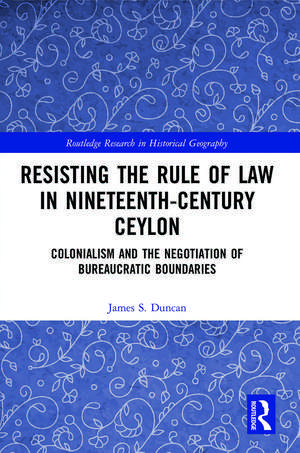Resisting the Rule of Law in Nineteenth-Century Ceylon: Colonialism and the Negotiation of Bureaucratic Boundaries: Routledge Research in Historical Geography
Autor James S. Duncanen Limba Engleză Paperback – 29 apr 2022
The tactical use of rule of law is explored within the three bureaucracies: the police, the courts and the prisons. Policing was often “governed at a distance” due to fiscal constraints and economic priorities and the enforcement of law was often delegated to underpaid Ceylonese. Spaces of resistance opened up as Ceylon was largely left to manage its own affairs. Villagers, minor officials, as well as senior British government officials, alternately used or subverted the rule of law to achieve their own goals. In the courts, the imported system lacked political legitimacy and consequently the Ceylonese undermined it by embracing it with false cases and information, in the interests of achieving justice as they saw it. In the prisons, administrators developed numerous biopolitical techniques and medical experiments in order to punish prisoners’ bodies to their absolute lawful limit. This limit was one which prison officials, prisoners, and doctors negotiated continuously over the decades.
The book argues that the struggles around rule of law can best be understood not in terms of a dualism of bureaucrats versus the public, but rather as a set of shifting alliances across permeable bureaucratic boundaries. It offers innovative perspectives, comparing the Ceylonese experiences to those of Britain and India, and where appropriate to other European colonies. This book will appeal to those interested in law, history, postcolonial studies, cultural studies, cultural and political geography.
| Toate formatele și edițiile | Preț | Express |
|---|---|---|
| Paperback (1) | 259.98 lei 6-8 săpt. | |
| Taylor & Francis – 29 apr 2022 | 259.98 lei 6-8 săpt. | |
| Hardback (1) | 1000.27 lei 6-8 săpt. | |
| Taylor & Francis – 6 iul 2020 | 1000.27 lei 6-8 săpt. |
Preț: 259.98 lei
Preț vechi: 311.41 lei
-17% Nou
Puncte Express: 390
Preț estimativ în valută:
49.75€ • 50.95$ • 41.39£
49.75€ • 50.95$ • 41.39£
Carte tipărită la comandă
Livrare economică 19 martie-02 aprilie
Preluare comenzi: 021 569.72.76
Specificații
ISBN-13: 9780367515522
ISBN-10: 0367515520
Pagini: 278
Ilustrații: 20
Dimensiuni: 156 x 234 mm
Greutate: 0.45 kg
Ediția:1
Editura: Taylor & Francis
Colecția Routledge
Seria Routledge Research in Historical Geography
Locul publicării:Oxford, United Kingdom
ISBN-10: 0367515520
Pagini: 278
Ilustrații: 20
Dimensiuni: 156 x 234 mm
Greutate: 0.45 kg
Ediția:1
Editura: Taylor & Francis
Colecția Routledge
Seria Routledge Research in Historical Geography
Locul publicării:Oxford, United Kingdom
Public țintă
Postgraduate and UndergraduateCuprins
Part 1: Introduction. 1. Introduction. 2. Criminological Theories and the “Men on the Spot”. Part 2: The Police and the Arts of Subterfuge. 3. Struggles in Time and Space: Policing the Towns. 4. Governing at a Distance: Policing the Countryside. Part 3: The Courts and the Arts of Dissembling. 5. Taking Liberties: The Court Bureaucracy and its Discontents. 6. Speaking Lies to Power: How the Ceylonese Used the Courts. Part 4: The Prison and the Arts of Dark Biopower. 7. Creating Spaces of Deterrence. 8. Experiments in the Production of Bodily Suffering. 9. Determining the Limits of Bare Life. 10. Conclusion. Bibliography. Index.
Notă biografică
James S. Duncan was Reader in Cultural Geography, University of Cambridge until his retirement. He is now Emeritus Fellow of Emmanuel College. His research interests are cultural and historical geography, South Asian history and history of law.
Descriere
This book offers in-depth insights on the struggles implementing the rule of law in nineteenth century Ceylon, introduced into the colonies by the British as their "greatest gift."
















